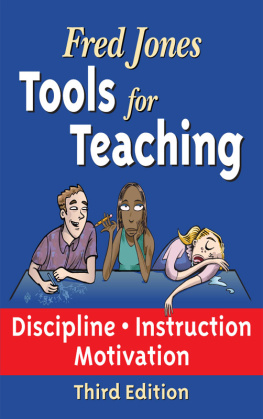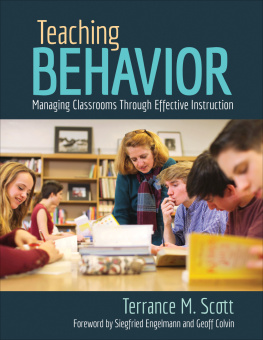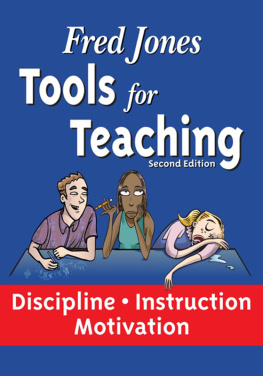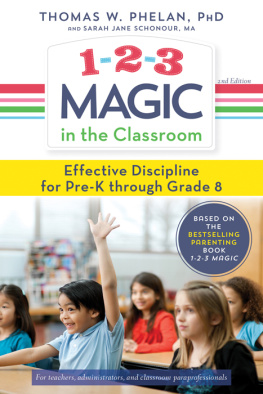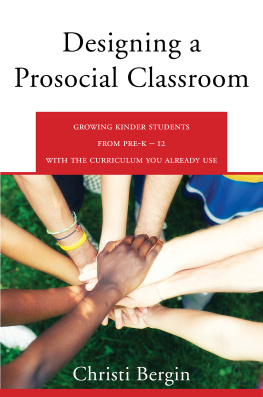Contents
Acknowledgements
I credit my wife Jo Lynne with much of my interest in classrooms. Throughout my years in graduate school she was a classroom teacher, and every night when she came home from work, we had a 1-hour debriefing like the astronauts have when they return from space. During our debriefings I relived every trauma and gratification of the day, and by Thanksgiving, her students were members of the family. After years of debriefings I became very interested in classrooms. When I began my classroom management research, Jo Lynne was a collaborator, and she has been my partner ever since.
Jo Lynne was the kind of teacher who did several hours of work each evening to prepare for the next day. Knowing how hard dedicated teachers work has been a crucial consideration in the development of the classroom management methods contained in this book. It is not enough for a technique to succeed. It must also be affordable in terms of the teachers time and energy.
I must also acknowledge a large debt to my family. I come from a family of teachers and have always appreciated the competence and dedication that goes into being a teacher. In addition, my parents blending of love and firmness helped me to see discipline management in child rearing as an extension of nurturance.
Our son Patrick has been my partner in preparing this manuscript. I wanted it to have the spontaneous, conversational character of a workshop. To accomplish this, I dictated major portions of the manuscript. Patrick would type a section as I repeatedly stopped and started, and then we would read it on the computer screen. Patrick was very patient and helpful. I remember one time dictating a paragraph on verbosity. After we read it over, I said to Patrick, What do you think? He said, Dad, you dont want to know. I reread it and cracked up.
Our son, Brian did all of the cartoons and graphics for the book. He was finishing course work at San Francisco Art Institute just as Patrick and I were beginning the manuscript. Brian has cartooning in his blood. The timing was perfect. I said to Brian, How would you like your first job to be drawing 60 or 70 cartoons for my new book? We are going to do it in full color. It was not a hard sell.
I wish to thank Hans Miller, my mentor at UCLA, who gave me my foundation in behavior management. I am also indebted to a series of outstanding graduate students at the university of Rochester Robert Eimers, William Fremouw, Andrew Burka, Richard Cowen, Herbert Weis, and Kenneth Docteur as well as undergraduate Steve Carples. They were partners in the research that validated many of the procedures contained in Tools for Teaching.
I would also like to thank my daughter, Anne, for her careful proofreading. And I am especially grateful to Virginia Rossi, Dorothy Derge-Elb, Wendy Kent, and my daughter-in-law Monique Jones for keeping the office running during the months of rewriting.
Preface
Over twenty years ago I published two books with McGraw-Hill entitled, Positive Classroom Discipline and Positive Classroom Instruction. I thought they should be published as textbooks. But McGraw-Hill said, There is no point in publishing a textbook for a course that no one is offering. I couldnt fault their reasoning.
A lot has changed since then. Teachers routinely receive courses in classroom management as part of their training. During my workshops young teachers will say such things as, Oh, you are the Fred Jones. You were in my college textbook. I thought you were dead.
I procrastinated in updating these first two books rationalizing that fundamentals never change. That was only a half-truth. Fundamentals dont change, but my understanding of them does. I have never given a workshop without returning home knowing more than I did when I went out. New insights come from stories that teachers tell me, from discussions over lunch, or perhaps from answering a question that forces me to think on my feet in a new way. And, of course, I read constantly.
I realized how much my understanding of classroom management had grown when I finally sat down to write Tools for Teaching. Discussions of key aspects of classroom management such as Meaning Business and Responsibility Training were on an entirely different level from those contained in Positive Classroom Discipline and Positive Classroom Instruction. They were more thorough and clear.
Five years later my daughter, Anne, the college librarian, told me, Libraries wont order any reference book with a copyright date more than five years old. You need to revise Tools for Teaching. But, its just fine the way it is, I replied. Too bad, she said. Needless to say, once I got into it, I found a lot of room for improvement.
Now five years later the same logic applies once again. New research is available, and ideas have shifted. The first two chapters of the third edition, for example, explain the nature of Tools for Teaching far better than before.
But the biggest change is in .
The other major change is the addition of contains a synopsis of current research on the building of mastery and memory at a neurological level. This research affirms the importance of deep practice and repetition in constructing rapid, reliable pathways for the execution of skills. The second part of the chapter applies this knowledge to building the skills contained in Tools for Teaching.
The Study Group Activity Guide
Web Site: www.fredjones.com
In this age of cyberspace, a book can be much more than the pages between a cover. As soon as the book manuscript was completed, we started to write a study guide that would allow teachers to conduct training of the highest quality at their school sites. The resulting Study Group Activity Guide is provided for free at our web site.
Study Group Activity Guide
The Study Group Activity Guide structures twelve 45- minute after school meetings during which teachers master the skills contained in Tools for Teaching. Each meeting includes:
reading assignments with focus questions
sharing and problem solving
performance checklists
skill building activities
Thorough protocols are provided for each skill building exercise. These protocols contain every prompt and clarifying remark used by Dr. Jones during his workshop. Skill building activities include not only the practice of discrete management skills but also simulations of more complex classroom management dilemmas.
In addition, coaching skills are described in detail so that participants can help each other learn by doing. During peer coaching, teachers employ Say, See, Do Teaching and Praise, Prompt and Leave so that skill practice is safe and comfortable. In addition, a Group Problem Solving Process is provided so that participants can develop strategies for managing difficult problems as they arise.
Parent Edition: Facilitator Handbook
A series of DVDs has been developed to help parents apply the skills of Tools for Teaching in the home. The book, Tools for Teaching, and the DVDs, Tools for Teaching: Parent Edition, serve as primary resources for parent training.
To structure skill training with parents, a Facilitators Handbook has been posted on the web site with handouts for each of 10 meetings. As with the Study Group Activity Guide, it is provided free of charge.
Other Web Resources
While Study Group meetings include sharing, the web site also provides opportunities for teachers to share their ideas and experiences with colleagues worldwide. Sections of the web site devoted to sharing include a Preferred Activity Bank, applications of Bell Work, tips for substitute teachers, a message board, and a college report page.

